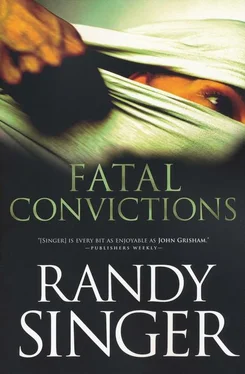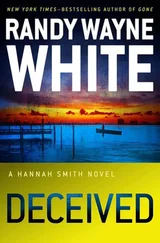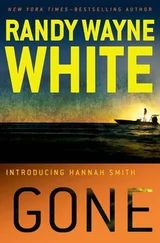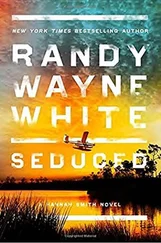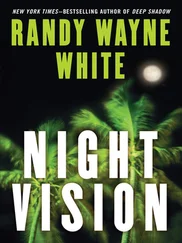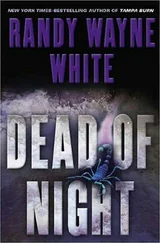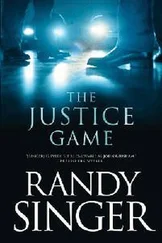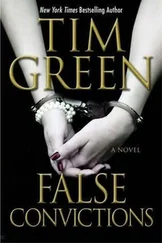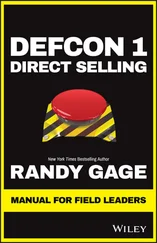Randy Singer - Fatal Convictions
Здесь есть возможность читать онлайн «Randy Singer - Fatal Convictions» весь текст электронной книги совершенно бесплатно (целиком полную версию без сокращений). В некоторых случаях можно слушать аудио, скачать через торрент в формате fb2 и присутствует краткое содержание. Жанр: Криминальный детектив, на английском языке. Описание произведения, (предисловие) а так же отзывы посетителей доступны на портале библиотеки ЛибКат.
- Название:Fatal Convictions
- Автор:
- Жанр:
- Год:неизвестен
- ISBN:нет данных
- Рейтинг книги:3 / 5. Голосов: 1
-
Избранное:Добавить в избранное
- Отзывы:
-
Ваша оценка:
- 60
- 1
- 2
- 3
- 4
- 5
Fatal Convictions: краткое содержание, описание и аннотация
Предлагаем к чтению аннотацию, описание, краткое содержание или предисловие (зависит от того, что написал сам автор книги «Fatal Convictions»). Если вы не нашли необходимую информацию о книге — напишите в комментариях, мы постараемся отыскать её.
Fatal Convictions — читать онлайн бесплатно полную книгу (весь текст) целиком
Ниже представлен текст книги, разбитый по страницам. Система сохранения места последней прочитанной страницы, позволяет с удобством читать онлайн бесплатно книгу «Fatal Convictions», без необходимости каждый раз заново искать на чём Вы остановились. Поставьте закладку, и сможете в любой момент перейти на страницу, на которой закончили чтение.
Интервал:
Закладка:
“Good point,” Alex conceded. “If you don’t really care about justice, this could be a win-win for you guys.”
He left the courtroom and pulled out his cell phone. Two could play this game.***
One hour later, the jury returned with its verdict. Judge Thomas looked at the verdict sheet and frowned. “Is this your verdict?” he asked the forewoman.
“It is, Your Honor.”
“So say you all?”
The jurors nodded their heads.
Thomas studied the paper for another moment and looked at Alex and Aisha. Though Hajjar v. Atlantic Surf Shop, Inc. didn’t exactly have the high stakes of a capital murder trial, Alex still felt his heart in his throat. It’s a summer job, he reminded himself. But he knew it meant a whole lot more.
“‘We the jury, in the case of Hajjar v. Atlantic Surf Shop, Inc., find our verdict in favor of the defendant,’” Judge Thomas read.
Alex felt the gut punch and heard Aisha exhale next to him. “It’s all right,” he whispered. “You did the right thing by filing this case.”
It was hard not to stare at the jury with contempt while Judge Thomas thanked them for their service. Alex found himself hoping that they would someday be victims of discrimination. After the jury left, it was even harder to shake Kendall Spears’s hand and congratulate him.
The blow was softened somewhat when Judge Thomas asked Alex to approach the bench before he left the courtroom. “You did a great job,” the judge said softly. “You’ve got your granddad’s style.”
Except my grandfather would have won, Alex thought. But he was a good enough lawyer to keep that sentiment to himself.
“Thank you, Your Honor.”
8
Unlike most attorneys, Alex had no law school diploma hanging on the vanity wall of his office. Virginia was one of the few states where a lawyer could still “read the law,” pass the bar, and receive a law license. Under Virginia’s law reader program, an aspiring attorney could study under an approved lawyer and qualify for the bar exam once he had completed certain prescribed courses. Thomas Jefferson had become a lawyer that way. As had Patrick Henry. Several generations later, Alex’s grandfather had followed in their steps.
Alex became a law reader more out of frustration than tradition. He had attended Richmond Law School for a year, but he hated the endless debates on esoteric legal theories and the word parsing that seemed to dominate his law school curriculum. Alex wanted to be a trial lawyer, quick on his feet like his grandfather. But his classes seemed to emphasize intellectual mind games. Some of his professors had never seen the inside of a courtroom.
Having worked in his grandfather’s law firm during the summer after that first year, Alex felt like he learned more about the practice of law in three months than he had in his first full year of formal education. His grandfather, no fan of law schools himself, said he was not surprised. He suggested that Alex consider reading the law while he made some money working at the firm.
Two years later, Alex became one of the handful of Virginia lawyers who passed the bar without graduating from law school. He framed his law license with no small amount of pride, though the phrase “law reader” also came with a little baggage and a huge chip for the shoulder. Like his grandfather, Alex would have to go through his career proving that he belonged.
Taking the place of a law school diploma on Alex’s vanity wall was a framed piece of yellow legal paper with his grandfather’s sloppy handwriting on it. The page was labeled: Madison and Associates-Competitive Edge
His grandfather had written the list the day he told Alex that he was dying from cancer. “I guess you’ll take over this firm a little sooner than we planned,” John Patrick Madison had said. “Here’s a few things you need to keep in mind.”
He wrote down ten items, talked to Alex about them for thirty minutes, and then told Alex they needed to get back to work. Not one tear was shed. It was like every other teaching session Alex ever had with his grandfather. No nonsense. Keep it real. Can the drama. His grandfather had faced death with the same level of fear he exhibited before a big case. In other words… none.
Alex kept the list and had it framed after his grandfather passed away.
The first sentence was characteristically blunt: Good lawyers don’t advertise.
Alex thought about that advice as he stopped to chat with the news crews in front of the Virginia Beach courthouse. His grandfather never paid for advertising, but he also never turned down a free interview. He told Alex that only legal dinosaurs turned up their noses at the media. “I’m an advocate for my client,” he explained. “And sometimes I want to send a message to the jury before we get into the courtroom.”
Alex handled a few questions while Aisha stood next to him. He waited until somebody asked whether they were going to appeal before he made his announcement.
“We’ve decided not to appeal,” Alex said, “because if we win, Aisha would end up working at Atlantic Surf Shop, and it’s pretty obvious they don’t want her there. But fortunately for her, not all surf shops have a Look Policy that forces you to check your religious beliefs at the door. In fact, the owners of Burke’s Surf on Laskin Road believe strongly that the surf culture wants people just to be who they are. They’ve therefore offered Aisha a job for the summer, hijab and all.”
A few reporters congratulated Aisha, and she gave them a beautiful white smile. She told them how excited she was to start at Burke’s. Alex even added that most locals preferred Burke’s to the Atlantic Surf Shop anyway. By the time the interview ended, it was hard to tell who had won and who had lost the court battle just a few minutes earlier.
Alex smiled for the cameras as well but would be kicking himself all the way back to the office. He should have checked Aisha’s Facebook page. He had been complacent. His grandfather would have never missed that important detail.
Alex had not just lost the case. He had violated principle number five on his grandfather’s competitive edge list, a sentence he knew by heart, just like every other sentence on that yellow sheet of paper: Never get outworked by an Ivy League lawyer.
9
For Khalid Mobassar, sleep had become a luxury. He spent each night in the reclining chair next to Ghaniyah’s bed, waking when she stirred, checking on her while she slept, exulting in each small step on the road to recovery. When Ghaniyah was moved from ICU to the brain trauma rehab center, Khalid followed her, hauling his small duffel bag of clothes and toiletries, his briefcase full of books and papers, his computer, his prayer rug, and his Qur’an. He left her side for only a few hours each day to go home and shower and to stop by the mosque.
The medical side of things was confusing at best. Khalid became familiar with the vocabulary of treatment for traumatic brain injury, or TBI, both from listening to the doctors and from scouring the Internet. Ghaniyah had been admitted to the hospital with a 12 on the Glasgow Coma Scale, indicating moderate brain damage. She had briefly lost consciousness before rescuers arrived at the scene. Fortunately, a CT scan and MRI showed no swelling of the brain or the type of cranial bleeding that would require surgical intervention.
But according to the doctors, many closed head injuries produced microscopic changes not easily detectable on the radiological tests. Ghaniyah’s official diagnosis was moderate traumatic brain injury with diffuse axonal injury and ischemia. Her prognosis for a full recovery was “guarded.”
Five days after the accident, a neuropsychologist had performed a basic neurological assessment designed to reveal the extent of the damage. A full battery of neuropsych testing would come later, but the preliminary results were sobering. Though no longer in a coma, Ghaniyah had suffered memory loss, personality change, and moderate impairment to her executive functioning skills. She had a hard time trying to focus and couldn’t handle more than one task at a time. She experienced mood swings and depression. These were all symptoms of right frontoparietal injury, the neuropsychologist explained. For Khalid, it felt like someone had taken the woman he married and placed another person in her body, someone more sluggish and with unpredictable emotions.
Читать дальшеИнтервал:
Закладка:
Похожие книги на «Fatal Convictions»
Представляем Вашему вниманию похожие книги на «Fatal Convictions» списком для выбора. Мы отобрали схожую по названию и смыслу литературу в надежде предоставить читателям больше вариантов отыскать новые, интересные, ещё непрочитанные произведения.
Обсуждение, отзывы о книге «Fatal Convictions» и просто собственные мнения читателей. Оставьте ваши комментарии, напишите, что Вы думаете о произведении, его смысле или главных героях. Укажите что конкретно понравилось, а что нет, и почему Вы так считаете.
